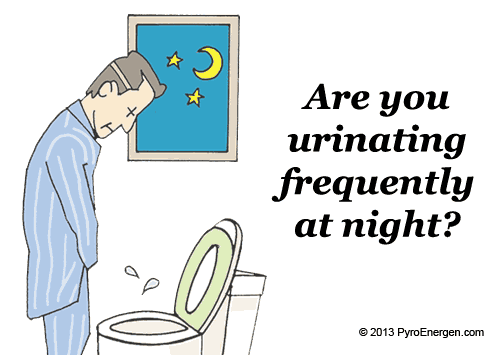Courtesy of renalandurologynews.com
Desmopressin treatment appears to reduce nocturia ( the need to get up in the night to urinate, thus interrupting sleep. Its
occurrence is more frequent in pregnant women and in the elderly.
Nocturia could result simply from too much liquid intake before going to
bed (usually the case in the young), or it could be a symptom of a
larger problem, such as sleep apnea, hyperparathyroidism,[1] chronic renal failure, urinary incontinence, bladder infection, interstitial cystitis, diabetes, congestive heart failure, benign prostatic hyperplasia, ureteral pelvic junction obstruction,[2] uterine fibroids, eating disorders, diabetes insipidus or prostate cancer ) and other lower
urinary tract symptoms while also significantly increasing testosterone
levels in men with late-onset hypogonadism. These new results from a 62-patient prospective trial suggest that nocturia may be related to hypogonadism in this population.
The study, by Jong Wook Kim, MD, PhD, of the Korea University Guro
Hospital, Seoul, South Korea, and colleagues, analyzed the parameters of
men treated with demopressin in an open-label trial that ran from April
2011 to November 2012. The men were older than 40 years, had at least
two nocturia episodes per night, and serum total testosterone levels
below 3.5 ng/mL or a positive score on the Androgen Deficiency in Aging
Men scale. The investigators excluded individuals with cardiovascular
disease, hyponatremia, primary hypogonadism, hypogoandotropic
hypogonadism, or who were using hypnotics or desmopressin for treatment
of other diseases such as diabetes. The subjects received desmopressin
0.1 mg once daily.
The study population had an average age of 68.4 years and average body mass index of 24 kg/m2.
Their mean total testosterone at baseline was 4.28 ng/mL, their mean
free testosterone was 5.47 pg/mL, and their mean PSA level was 1.4
ng/mL.
The total and free testosterone levels increased significantly in men
with baseline total testosterone levels below 3.5 ng/mL, researchers
reported at the 33rd Congress of the Societé Internationale
d'Urologie. Their mean total testosterone levels increased from 2.85 to
3.97 ng/mL and their mean free testosterone levels increased from 3.84
to 4.86 pg/mL.
In addition, the patients' average scores on the overall
International Prostate Symptom Score (IPSS) scale dropped significantly,
as did their scores on question 7 of the IPSS (which probes nocturia),
the IPSS subscores of voiding and storage symptoms, and the IPSS quality
of life question. The patients' nocturnal urine volume levels also fell
significantly, as did their nocturnal polyuria index scores, their
actual number of nightly voids, the nocturia index scores and their
nocturnal bladder capacity index scores.
“Although the mechanism of action is still unknown, we suggest that
desmopressin could correct disturbances of the circadian regulation of
testosterone secretion,” the authors concluded in their poster
presentation.
Parameters not changed by desmopressin treatment included blood urea
and nitrogen level, creatinine level, potassium and chloride levels,
overall International Index of Erectile Function score, and Aging Male
Symptom score.

No comments:
Post a Comment
All coments are moderated. Obscenities get you tossed out. Do not leave personal info incomments, but professional contact info is accepted.